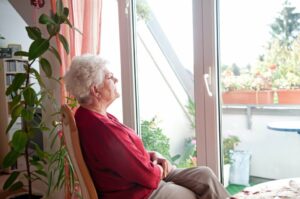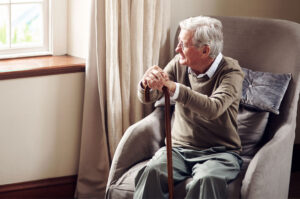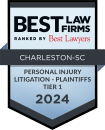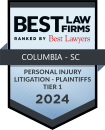
Many South Carolinians rely on nursing homes and long-term care facilities to look after loved ones who need help caring for themselves. When family members can’t meet the medical and physical needs of elderly or disabled loved ones, a good nursing home can be a godsend.
Unfortunately, some patients suffer preventable or intentional harm in these facilities. According to the National Council on Aging (NCOA), an estimated 10 percent of Americans aged 60 and older have endured some type of elder abuse. Many experts suggest the true rate of elder abuse is likely much higher since it is difficult to detect and often goes unreported.
If you have reason to believe that your loved one may be a victim of nursing home abuse, you may be unsure where to turn for help. At Joye Law Firm, we have zero tolerance for elder abuse or neglect. Our Summerville nursing home abuse lawyers stand ready to take action on your behalf. Call us today at (888) 324-3100 or contact us online to discuss the details of your situation in a free initial consultation.
What Is Nursing Home Abuse?
Many South Carolina nursing homes provide residents with excellent care, but sadly, this is not always the case. In some facilities, heartbreaking nursing home abuse and neglect occur when caretakers cause intentional or accidental harm to long-term residents.
Some nursing home residents experience unconscionable abuse at the hands of malicious staff members. However, abuse and neglect also occur as a side effect of a facility’s inadequate staffing or unsafe policies. Negligent staff members and administrators who abuse or take advantage of vulnerable residents can be held liable for nursing home abuse and neglect.
Signs and Types of Nursing Home Abuse and Neglect in Summerville
Unfortunately, there are many types of nursing home abuse and neglect, some of which are more difficult to detect than others. Here are some of the most common types of nursing home abuse in Summerville and the signs to watch out for.
Physical abuse – Physical abuse occurs when nursing home staff intentionally cause residents physical harm. Common types of physical abuse include slapping, kicking, shaking, and unnecessarily physically restraining residents.
Signs of physical abuse include the following:
- Unexplained welts or lacerations
- Bruises from physical restraints
- Bone fractures
- Caregivers refusing to leave patients alone with family
Neglect – Neglect occurs when nursing home staff fail to ensure residents have the basic care or living essentials they need. Common types of neglect include withholding meals, ignoring medical needs, and failing to maintain basic hygiene.
Some signs of neglect are:
- Lack of heat or clean water
- Inadequate bathing or dressing
- Dirty or messy living conditions
- Bedsores, dehydration, and weight loss
Emotional abuse – Emotional abuse occurs when nursing home staff say or do anything with the intention of causing residents emotional or psychological harm. Common types of emotional abuse include bullying, threatening, humiliation, and isolation from others.
The following are some signs of emotional abuse:
- Unusual rocking or muttering
- Sudden fearfulness or anxiety
- Withdrawal, depression, and agitation
- Controlling caregiver attitudes
Financial exploitation – Financial exploitation occurs when nursing home staff abuse their access to a resident to steal the resident’s assets. Common types of financial exploitation include identity theft, stealing valuables, and using a resident’s money to make unauthorized purchases.
Signs of financial abuse include:
- Unusual charges for unknown services
- Lack of necessary medication or care
- Missing valuables or cash
- Duplicate bills for treatment
Sexual abuse – Sexual abuse occurs when nursing home staff expose residents to explicit content or unwanted sexual contact. Common types of sexual abuse include unwanted touching or exposure, forced nudity, and unwanted sex acts.
Signs of sexual abuse include:
- Unexplained STDs or urogenital infections
- Stained or torn undergarments
- Bruising or injuries around the breasts, genitals, or anus
Nursing Home Abuse Statistics
The following statistics demonstrate just how serious the issue of nursing home abuse is in the United States:
- According to the NCOA, as many as five million elderly Americans, many of whom live in nursing home facilities, are abused every year.
- According to the Center for Victim Research (CVR), a recent survey of nursing home resident families found that 74 to 87 percent of residents had experienced abuse or neglect within the past year.
- Additional data from the CVR says 24.3 percent of surveyed nursing home residents reported physical abuse from a staff member within the past year.
- In another survey, 40 percent of nursing home staff members admitted to psychological abuse of residents, and 10 percent admitted to physical abuse of residents within the past year.
When Is a Summerville Nursing Home Liable for Abuse or Neglect?
Nursing home facilities, administrators, and staff members are responsible for providing residents with quality care.
Nursing homes and their employees may be liable for abuse or neglect of a nursing home resident when any of the following occur:
- Administrators fail to properly screen staff members before hiring
- Administrators fail to provide proper training for staff
- Administrators fail to maintain proper staffing levels
- Administrators fail to provide adequate security
- Staff members fail to provide basic daily necessities, such as food or medication
- Staff members fail to address infections or other medical issues
- Staff members fail to protect residents from hazards
- Staff members intentionally abuse or unreasonably restrain residents
Signs You Need a Nursing Home Abuse Lawyer
If you notice any of the following warning signs, then you may need help from a knowledgeable nursing home abuse attorney:
- The disappearance or sudden lack of contact with your loved one
- Physical signs of abuse, such as bruises, bedsores, or bleeding
- An unusually unkempt, dirty, or malnourished appearance
- Sudden disorientation, anxiety, aggression, or fatigue
- A sudden or unexpected decline in cognitive faculties
- Missing possessions or unexplained financial or legal transactions
What to Do About Suspected Nursing Home Abuse
If you suspect that someone you love may be suffering from nursing home abuse or neglect, it’s important to act quickly. When your loved one’s health and safety are on the line, the last thing you want to do is allow the suspected abuse or neglect to continue.
The following are some important steps you should take to address the situation and ensure your loved one is safe:
- Talk to your loved one privately – Visit your loved one and talk to them in private about your concerns. Listen for any signs that they may be trying to minimize or conceal what is happening. If anything feels off, it’s best to trust your instincts and err on the side of caution.
- Ask the facility to take corrective action – When residents and their loved ones develop concerns, good facilities will hear and address those concerns. If you can, speak to the nursing home administration directly about what you have noticed. A quality nursing home will be able to suggest an appropriate solution.
- Ask questions and document everything – If the facility has nothing to hide, they shouldn’t have any objections to your reasonable, respectful questions. Don’t be afraid to ask staff members about any policies or procedures that seem unusual or unsafe.
- Call 911 if your loved one is in immediate danger – If you notice any obvious signs that your loved one is in immediate danger of harm, report your concerns to the nursing home administrator. If the administrator cannot address your concerns, call 911 immediately.
- File a report with a local agency – If nursing home administrators refuse to address your concerns, you may want to report the behavior to a local agency specializing in protecting vulnerable adults. You can call the state’s Adult Protective Services office or reach out to the Long-Term Care Ombudsman.
- Talk to a nursing home abuse lawyer – An experienced nursing home abuse attorney can help you develop a strong case, hold negligent facilities accountable, and demand fair compensation on your loved one’s behalf.
How a Summerville Nursing Home Abuse Lawyer Can Help
Learning that your loved one may be the victim of nursing home abuse can be shocking and overwhelming. If you’re already juggling unexpected medical needs and searching for a new home for your loved one, the prospect of taking legal action can seem unmanageable.
An experienced Summerville nursing home abuse lawyer at Joye Law Firm can relieve some of the pressure you’re facing and help you seek justice on behalf of your loved one in the following ways:
- Helping you understand the local and federal laws that apply to your case
- Conducting an independent investigation to uncover useful evidence and determine who can be held liable
- Preparing and filing a strong nursing home abuse lawsuit on your behalf
- Communicating with nursing home staff, insurance providers, and other attorneys on your behalf
- Negotiating aggressively to maximize your settlement or seeing your lawsuit through to a favorable verdict, if necessary
Speak to an Experienced Nursing Home Abuse Attorney in Summerville
Our personal injury attorneys at Joye Law Firm have more than 50 years of experience serving injury victims in Summerville and the surrounding South Carolina areas. We believe that elderly and disabled Americans have the right to receive respectful and attentive care. Our team is prepared to provide quality legal representation for nursing home abuse victims and their families.
To learn more about your legal options, call Joye Law Firm today at (888) 324-3100 or fill out our online contact form. We can evaluate your situation in a free case review and begin work on your case with no up-front or out-of-pocket cost to you.
Joye Law Firm Summerville Office Location
1731 N Main St Suite A-1
Summerville, SC 29483
(854) 220-9905




























